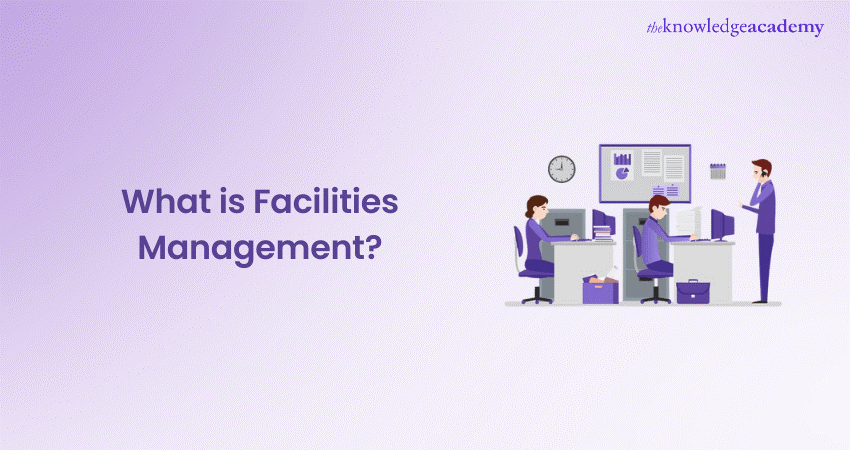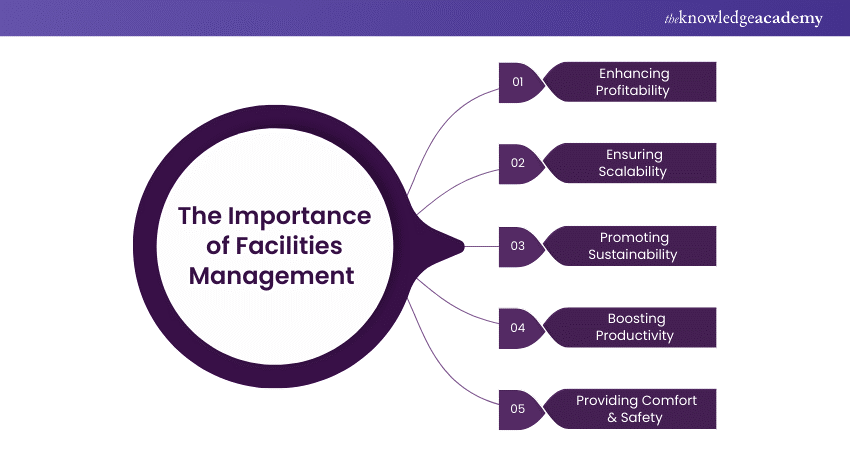We may not have the course you’re looking for. If you enquire or give us a call on +43 720 115337 and speak to our training experts, we may still be able to help with your training requirements.
Training Outcomes Within Your Budget!
We ensure quality, budget-alignment, and timely delivery by our expert instructors.

Have you ever wondered who ensures that your workplace remains functional, safe, and comfortable? Enter the world of Facilities Management. This crucial discipline involves a myriad of tasks aimed at maintaining and improving the physical infrastructure of an organisation. “What is Facilities Management” will no longer be a difficult question once you are done reading through this blog!
Table of Contents
1) What is Facility Management?
2) The Importance of Facilities Management
3) Key Functions of Facilities Management
4) Types of Facility Management
5) Structure of a Facilities Management Department
6) Relevance of Facilities Management
7) Conclusion
What is Facility Management?
Facility Management is the backbone of any well-run organisation, encompassing a wide range of disciplines and services to ensure the functionality, comfort, safety, and efficiency of the built environment.
At its core, Facility Management involves the coordination of people, processes, and places within a physical workplace. This could include anything from maintaining the HVAC systems and ensuring security protocols are followed, to space planning and sustainability initiatives. Essentially, it's about creating an optimal environment for employees to thrive and the business to succeed.
The Importance of Facilities Management
The significance of Facilities Management cannot be overstated. It touches every aspect of an organisation, influencing productivity, employee satisfaction, and even the bottom line. Let’s delve into why it’s so crucial.

1) Enhancing Profitability
Effective Facilities Management plays a pivotal role in enhancing an organisation’s profitability. By ensuring that all systems are functioning efficiently, it minimises downtime and reduces the need for costly emergency repairs. Additionally, strategic space management can optimise the use of available space, potentially reducing real estate costs. By streamlining operations and maintaining high standards of maintenance, Facilities Management can contribute significantly to the financial health of an organisation.
2) Ensuring Scalability
Scalability is necessary. This factor is needed for any growing business. Facilities Management ensures that the physical infrastructure can adapt to changing needs, whether that’s expanding office space, integrating new technologies, or accommodating more employees. Through careful planning and flexible design, facilities managers can create spaces that grow with the company, allowing for smooth transitions and minimal disruption.
Learn about tasks and rules for reliability assurance of complex equipment and systems with our Reliability Engineering Training – join now!
3) Promoting Sustainability
In today’s world, sustainability is no longer just a buzzword. It is a business imperative. Facilities Management plays a key role in promoting sustainable practices within an organisation. This includes implementing energy-efficient systems, reducing waste, and ensuring compliance with environmental regulations. By focusing on sustainability, facilities managers can help reduce operational costs and the company’s carbon footprint, while also enhancing its reputation as a responsible and forward-thinking organisation.
4) Boosting Productivity
A well-managed facility can significantly boost productivity. Comfortable, safe, and efficient work environments enable employees to focus on their tasks without distractions. Proper lighting, comfortable temperatures, and clean, well-maintained spaces all contribute to a more productive workforce. Facilities Management ensures that the workplace is conducive to work. It leads to higher employee satisfaction and performance.
5) Providing Comfort & Safety
The comfort and workplace safety of employees are paramount. It is responsible for making the work environment meet health and safety standards. It provides a comfortable space for employees. This includes everything from ergonomic furniture and clean restrooms to effective security systems and emergency preparedness plans. A focus on comfort and safety not only protects employees but also enhances their overall well-being and job satisfaction.
Key Functions of Facilities Management
Facilities Management encompasses a broad range of functions. All of these functions aim for smooth operation in the workplace. These include:
a) Maintenance and Repairs: Keeping all building systems operational and addressing any issues promptly.
b) Space Management: Optimising the use of physical space to meet organisational needs.
c) Security Management: Ensuring the safety of employees and assets through effective security measures.
d) Janitorial Services: Cleanliness and hygiene is maintained in the workplace.
e) Utilities Management: Managing energy use and other utilities to ensure efficiency and cost-effectiveness.
f) Health and Safety Compliance: Ensuring the workplace adheres to health and safety regulations.
These functions are essential for creating an environment where employees can perform their best and the organisation can thrive.
Types of Facility Management
Facilities Management can be divided into several types, each focusing on different aspects of maintaining and enhancing the workplace. Here are some of the main categories:
1) Customer Services
Customer services within Facilities Management include front-of-house operations, such as reception and mailroom services. These services ensure that both employees and visitors have a positive experience when they enter the facility. Effective customer services create a welcoming and professional atmosphere, reflecting well on the organisation.
2) Exterior Cleaning
Exterior cleaning involves maintaining the cleanliness and appearance of the building’s exterior, including windows, façades, and parking areas. A maintained exterior does not only enhance the aesthetic purpose, it also contributes to the longevity of the building materials, preventing damage and reducing the need for costly repairs.
3) Grounds Maintenance
Grounds maintenance includes the upkeep of landscaping, gardens, and outdoor spaces. This involves tasks such as mowing lawns, trimming hedges, and ensuring that pathways are clear and safe. Attractive and well-maintained grounds can create a positive first impression and provide a pleasant environment for employees and visitors.
4) Hygiene Services
To maintain a clean and healthy workplace, hygiene services are important. This includes regular cleaning of restrooms, kitchens, and communal areas, as well as waste management and pest control. Effective hygiene services help prevent the spread of illness, enhance employee well-being, and contribute to a positive working environment.
5) Transportation
Transportation management within Facilities Management involves coordinating and managing the transportation needs of the organisation. This can include fleet management, coordinating employee transportation services, and ensuring that parking facilities are adequate and well-maintained. Efficient transportation management helps ensure that employees and goods can move smoothly and efficiently.
6) Pest Control
An important element for maintaining safe and hygienic workplace. Facilities managers need to implement effective pest control measures to prevent infestations and ensure that the work environment remains clean and safe. Regular inspections and preventive treatments can help keep pests at bay, protecting both the facility and its occupants.
Structure of a Facilities Management Department
The structure of a facilities management department can differ. It depends on the size and needs of the organisation. However, it typically includes several key roles:
a) Facilities Manager: Oversees all Facilities Management activities and coordinates the efforts of the team.
b) Maintenance Technicians: Responsible for the day-to-day maintenance and repairs of building systems.
c) Custodial Staff: Ensure the cleanliness and hygiene of the workplace.
d) Security Personnel: Implement and monitor security measures to protect employees and assets.
e) Administrative Support: Handles the administrative tasks related to Facilities Management, such as record-keeping and scheduling.
1) Outsourcing Facilities Management
Many organisations choose to outsource some or all of their Facilities Management functions to specialised service providers. Outsourcing can give access to expertise and resources that may not be available in-house. It can also offer cost savings and allow the organisation to focus on its core business activities. However, it’s important to choose reputable service providers and establish clear contracts and communication channels to ensure effective collaboration.
Learn essential skills and strategies with our Product Management Course - join now!
2) Assessing Facility Operations
Regularly assessing facility operations is crucial for maintaining high standards and identifying areas for improvement. This can involve conducting audits, reviewing performance metrics, and gathering feedback from employees and stakeholders. Continuous assessment helps facilities managers stay proactive and ensures that the facilities continue to meet the needs of the organisation.
Relevance of Facilities Management
Facilities Management is more relevant today than ever before. It ensures that the physical infrastructure supports the organisation’s goals and provides a safe and comfortable space for employees. By focusing on efficiency, sustainability, and scalability, Facilities Management helps organisations navigate the challenges of a dynamic business environment and stay competitive in their respective industries.
Conclusion
Facilities Management is a multifaceted discipline that plays a crucial role in the smooth operation of any organisation. From ensuring the functionality and safety of the workplace to promoting sustainability and enhancing productivity, Facilities Management touches every aspect of the physical work environment.
Gain expertise in cost-effective maintenance with our Facilities Management Course- join now!
Frequently Asked Questions

The primary purpose of Facility Management is to ensure smooth workflow, comfort and functionality.

The four pillars of Facility Management are technology, people, processes and building.

The Knowledge Academy takes global learning to new heights, offering over 30,000 online courses across 490+ locations in 220 countries. This expansive reach ensures accessibility and convenience for learners worldwide.
Alongside our diverse Online Course Catalogue, encompassing 17 major categories, we go the extra mile by providing a plethora of free educational Online Resources like News updates, Blogs, videos, webinars, and interview questions. Tailoring learning experiences further, professionals can maximise value with customisable Course Bundles of TKA.

The Knowledge Academy’s Knowledge Pass, a prepaid voucher, adds another layer of flexibility, allowing course bookings over a 12-month period. Join us on a journey where education knows no bounds.

The Knowledge Academy offers various Industry Training, including Leadership Course, NLP Training and the CeMAP Course. These courses cater to different skill levels, providing comprehensive insights into Functions of Facilities Management and Their Importance.
Our Business Skills Blogs cover a range of topics related to Facility Management, offering valuable resources, best practices, and industry insights. Whether you are a beginner or looking to advance your knowledge of Facilites Management, The Knowledge Academy's diverse courses and informative blogs have got you covered.
Upcoming Business Skills Resources Batches & Dates
Date
 Facilities Management Training
Facilities Management Training
Fri 24th Jan 2025
Fri 28th Feb 2025
Fri 30th May 2025
Fri 15th Aug 2025
Fri 26th Sep 2025
Fri 31st Oct 2025







 Top Rated Course
Top Rated Course



 If you wish to make any changes to your course, please
If you wish to make any changes to your course, please


